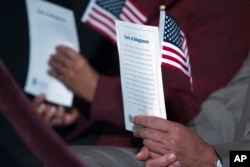With six months to go before the U.S. presidential election, several immigrant advocacy groups are coalescing in a campaign to help as many eligible permanent residents as possible become naturalized citizens and register to vote in time for Election Day.
The organizers — who include the Service Employees International Union, Mi Familia Vota, the National Partnership for New Americans, the United Food and Commercial Workers International Union and the Latino Victory Foundation — say the goal is to see at least 1 million green card holders become citizens this year.
The push is part of a national campaign called "Stand Up to Hate," which organizers say started as a result of rhetoric on the U.S. presidential campaign trail, particularly comments by presumptive Republican nominee Donald Trump.
A record 27.3 million Latinos are projected to be eligible to vote in the 2016 election, and of that number, 44 percent are Hispanic millennials, the Washington-based Pew Research Center said in an analysis published in January.
Leaning Democratic
Pew also said that from 2012 to 2016, an estimated 3.2 million young U.S.-citizen Latinos will have reached adulthood and become eligible to vote. Pew said Latino voters have leaned toward the Democratic Party in presidential elections for decades, and that the Latino electorate is among the nation's most demographically dynamic groups.
Advocates said Wednesday that the number of people filing naturalization applications climbed almost 14.5 percent in the first three months of the year, and they estimated it would go higher. They said the surge has been driven in part by immigrants feeling threatened by negative comments from Trump about Latinos and other groups. Trump has a 77 percent unfavorability image among U.S. Hispanics, according to a recent Gallup poll.
Trump angered Latinos after he accused Mexico of allowing "criminals and rapists" to illegally enter the United States. Trump has vowed to build an impenetrable wall along the border if elected and has called for Mexico to pay for it.
'Scaring' people into citizenship
Trump also said on national television that if he became president, illegal immigrants would have to leave the U.S. An estimated 11 million undocumented immigrants live in the country. In December, following terrorist attacks in Paris, Trump also called for a ban on Muslims entering the U.S.
“There is something going on here, and the way Donald Trump and other Republicans have been talking about immigrants, refugees, Latinos, Asians and Muslims is frankly scaring people into becoming citizens,” said U.S. Representative Luis Gutierrez, an Illinois Democrat who is involved in the effort to see legal permanent residents naturalized.
“We could literally hold a citizenship workshop every weekend and still not satisfy the demand” about the naturalization process, he said.
Stand Up to Hate said that in the past two months, it had reached out to 500,000 people about the naturalization process by conducting more than 300 workshops across the country. Currently, 8.8 million permanent residents in the U.S. are eligible to become naturalized citizens, according to campaign organizers.
To apply, an eligible green card holder currently must pay $680 upfront to cover the cost of naturalization forms and biometrics, said U.S. Citizenship and Immigration Services. Officials, however, have proposed raising the fee to $725 to cover costs.
Fee is 'in the way'
“People are still sending in their applications, but the fee sometimes stands in the way,” said Astrid Silva, director of Progressive Leadership Alliance of Nevada, an immigrant rights group. Silva, however, noted that a fee waiver program is available for permanent residents living at or below the poverty line. "Many of the people coming in [to the workshops] had never heard of the fee waiver."
A family of four earning between $36,450 and $48,600 would qualify for a partial fee waiver, organizers said. Each green card holder must apply separately. In a family where two people meet the requirements, the cost doubles, they said. Individuals whose income is below the federal poverty guideline can be eligible for a full fee waiver.
The lengthy application process would be followed by an interview with immigration officials, a citizenship test and a swearing-in ceremony at a determined date.
The advocates also said that even if this were not an election year, they would still encourage new Americans to become civic-minded. "Not becoming citizens is not good for our democracy," they said.





